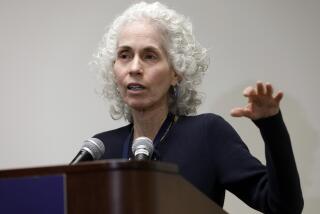County May End Its Contract With Key Operator of Clinics
One of the largest private health groups serving indigent East Los Angeles residents is expected today to lose contracts with the county worth $3.4 million amid allegations that it turned away destitute patients or improperly charged them for services that also were billed to the county.
If the Board of Supervisors votes today to rescind contracts with Community Health Foundation of East Los Angeles to treat the uninsured with county money, as the Department of Health Services recommends, thousands of patients will be affected.
Although patients won’t be denied service, some will be forced to shuttle to other medical facilities. The result is that many may face new burdens in receiving treatment, adding to the difficulty already imposed on the city’s disadvantaged residents in need of medical help.
Officials in Supervisor Gloria Molina’s office said patients of the four clinics would be sent to nearby clinics and County-USC Medical Center. The health department also will take over two clinics that Community Health Foundation was running in county buildings.
But Mandy Johnson, a spokeswoman for the industry group Community Clinic Assn., said: “Some of the clinics in the surrounding area are doing as much as they can at the moment,” and cannot absorb the thousands of patients that Community Health served every month.
The department of health began investigating the clinics last summer after receiving a tip that they were turning away uninsured patients who couldn’t pay for services, said department spokesman John Wallace. He said an undercover investigation confirmed the tip.
Rudy Diaz, executive director of Community Health, denied that the clinics have improperly charged the poor or refused care to those who couldn’t pay. He called the undercover probe flimsy.
“We would be rich right now if we collected money from those patients or even a small number of those patients,” Diaz said.
He said the organization, which receives about $19 million a year from federal, state and local contracts, will continue to operate the majority of its clinics.
This is the latest setback in the county’s effort to put together a stable network of private clinics to ease the burden of indigent care on the financially troubled public health system.
One group of clinics failed last year amid allegations that its director, a high-ranking doctor at Martin Luther King Jr./Drew Medical Center, spent most of his time working at his private clinics while drawing a six-figure county salary. And earlier this year, the county terminated contracts for five clinics when officials discovered they did not have the required operating licenses.
The county began signing outpatient contracts with private clinics in 1995, after the federal government waived Medicaid rules and allowed the use of federal money for outpatient care rather than solely for hospital care. A transition away from costly hospital care and toward cheaper outpatient clinics is seen as vital to pulling the county health department out of the red.
Community Health Foundation of East Los Angeles was one of the first private clinics to sign on. The county program has expanded to more than 100 clinics.
The clinics provide basic health care, treating everything from head colds to sexually transmitted diseases, for a flat fee to the county of $82 per visit.
“Reimbursement has always fallen far short of the cost of care” by close to 40%, Johnson said. The clinics absorb the difference, she said, because they believe it is their mission to take care of the low-income, uninsured population.
“So it’s a huge loss to the community to have that provider no longer providing services,” she said.
In a letter to the clinic chain, the health department said investigators posing as patients were told they would have to pay between $15 and $400 for services at three of the four clinics under contract with the county. Investigators did not visit the fourth clinic.
“Part of the contractual agreement is that [the clinics] will not turn away or bar our patients from receiving services nor charge them for care,” said Wallace of the Health Department. “It’s a violation, and we’re recommending that their contract be terminated. That’s pretty rare.”
Diaz said the investigators were leading in their questions and were asking the wrong people about the cost of care.
“If they would have waited, they would have been treated. And they wouldn’t have had to pay,” he said.
The county also audited 59 files and found two patients who claimed they were billed for medical visits at the clinic. But the investigators were able to reach just half of the 59 patients because of disconnected telephone numbers. A review of other files found 18 visits that could have been billed to federal programs, suggesting double billing, according to the Health Department letter.
Diaz attributed those findings to minor errors and said that if the county had looked at more files, it would have found the clinics to be reputable. Wallace said the Health Department “didn’t take this step lightly. The recommendation speaks for itself.”
Ines Toscano, 49, of a Monterey Park said she and her husband have been receiving free medical care for her diabetes and his prostate from the organization’s Whittier clinic since her husband lost his job months ago and with it their health insurance.
“I can’t go without my medications,” she said in Spanish. “They shouldn’t get rid of the clinics; they should expand them.”
More to Read
Sign up for Essential California
The most important California stories and recommendations in your inbox every morning.
You may occasionally receive promotional content from the Los Angeles Times.










